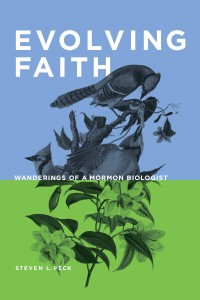Title: Evolving Faith – Wanderings of a Mormon Biologist
Author: Steven L. Peck
Publisher: Neal A. Naxwell Institute
Genre: Non-fiction
Year Published: 2015
Number of Pages:206
Binding: soft cover
ISBN10:978-0-8425-2944-0
ISBN13:978-0-8425-2945-7
Price: $19.95
Reviewed by Heather Young for the Association for Mormon Letters
It is really quite ridiculous that I would be so interested in reading Steven L. Peck’s latest offering, “Evolving Faith, Wanderings of a Mormon Biologist.” Not only am I the student who actively avoided all classes that hinted of science in high school and college (yay for the liberal arts!), I am also the person who spent four hours trapped in a car with an uber-religious person who was only interested in discussing evolution and creation theory and I had absolutely nothing to contribute on the subject.
Was the world created in literally six 24 hr. time periods? Fine by me.
How old is the earth? I dunno.
Does it matter? Not to me.
Is man made in the likeness of Adam or a Nethandral ancestor? Either way works for me. On and on and on for 320 long miles.
You can imagine how frustrated my travel companion felt by the time we parted ways.
On the other hand, my purposefully chosen ignorance of all things scientific makes me the perfect candidate to represent the great unwashed masses of Mormons who need to be educated on what we are missing out on. Let our Peck education begin.
After enthusiastically reading the Foreword, the Acknowledgements, and the Introduction in fine spirits, my reaction to the first chapter entitled “Embracing Science, Resisting Literalism, and Shifting Paradigms” was, in the immortal words of Bart Simpson (of Simpsons cartoon fame), “Ay Caramba!”
What the heck had I gotten myself into?
Thankfully, Peck makes allowances for readers’ ignorance. He carefully breaks down what science is, then describes common ways of measuring data in scientific ways and gently stretches the reader’s vocabulary in preparation for the whomping that is soon to come. Theistic naturalism, attemporal theism, temporal theism, eschatological theism, these are galaxies away from a Sunday school lesson on the Book of Genesis. Be forewarned — if you are not a Scrabble board game champion, you are going to want a dictionary nearby as the author dives deep into the language of his people.
I found the chapter “Crawling Out of the Primordial Soup” to be revelatory. Peck carefully makes his case for Darwinian evolution by drawing on philosophers, biologists, and religious scholars who have devoted their lives to such considerations. He regularly restates that these ideas are not his alone, and that he is not a radical in his thinking about evolution. I was impressed he referenced LDS theologian W.H. Chamberlin’s agreement with Darwin’s evolution theory and how Chamberlin was “part of the 1911 controversy at Brigham Young University when several scholars were dismissed because they were promoting evolution and modern biblical criticism.” I respect Pecks need to reiterate that his scholarship is based on clear thinking, without a subversive agenda. I found myself easily agreeing with the author regarding evolution and marveled that anyone could disagree with his findings.
As I worked (and yes, I mean that literally) my way through the graduate student level chapter on consciousness, I realized that he did a great job explaining the hippie, New Age-y LDS theology on the topic. Writing about how the uniquely Mormon ideas of intelligences according to LDS theologian B.H. Roberts included the differences between spirits and intelligences, “Intelligences are uncreated entities, some inhabiting spiritual bodies – bodies composed of fine spirit elements, other are intelligences unembodied in either spirit bodies or other kinds of bodies” warmed the bitter part of my heart that formed in 1989 when my BYU student ward bishop laughed me out his church office when I seriously asked him if he believed in aliens. This chapter allowed me to embrace the mystic side of my soul without feeling like an outsider in Mormondom.
Part two is where my liberal arts-minded heart started to sing. Peck’s childhood story of killing a mother woodchuck, thereby ending not only her life but also the life of her pups, brought a tear to my eye. His description of his personal evolution from an unaware young boy to a biologist who acknowledges that LDS culture often considers environmentalism a swear word, is a testament to his observational skills and human self-awareness.
The chapter entitled “My Madness” is where the collision of scientific knowledge, medical assumptions, human fragility, and workings of the spiritual life creates a scary narrative that kept me on the edge of my seat, hoping Peck survived his ordeal intact.
As I finished this book with a satisfied sigh, I realized I had more than achieved my goal of deepening my understanding of all things scientific and religious. I had also enlarged my appreciation for my time on earth and the part I can play in protecting its immeasurable gifts.

